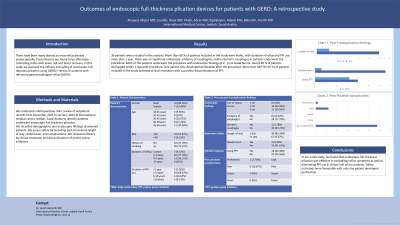Tuesday Poster Session
Category: Esophagus
P3267 - Outcomes of Endoscopic Full-thickness Plication Devices for Patients With GERD: A Retrospective Study
Tuesday, October 24, 2023
10:30 AM - 4:00 PM PT
Location: Exhibit Hall

Has Audio
- HB
Harith Baharith, MD
International Medical Center
Jeddah, Makkah, Saudi Arabia
Presenting Author(s)
Mazin Alsayed, MBBS, Roaa Ali. Joudah, MBBS, Abrar Mohamed. Khalil, MBBS, Adeeb Elghalayini, MD, Harith Baharith, MD
International Medical Center, Jeddah, Makkah, Saudi Arabia
Introduction: There have been many devices to treat reflux disease endoscopically. These Devices are found to be effectively controlling reflux with lower risk and faster recovery. In this study we assessed the efficacy and safety of endoscopic full-thickness plication using GERDx™ device in patients with refractory gastroesophageal reflux (GERD).
Methods: We conducted a Retrospective chart review of outpatient records from December 2021 to January 2023 at international medical center, Jeddah, Saudi Arabia to identify patients underwent endoscopic full-thickness plication. We recorded demographics and endoscopic findings of selected patients. We assess safety by recording post-procedural length of stay, readmission, and complications. We reviewed efficacy by clinical resolution and discontinuation of proton pump inhibitors.
Results: 36 patients were included in the analysis. More than 80 % of patients included in the study were males, with duration of reflux symptoms and PPI use more than 1 year. There was no significant endoscopic evidence of esophagitis; and/or Barrett's esophagus in patients underwent the procedure. Most of the patients underwent the procedure with endoscopic findings of 2 - 3 cm hiatal hernia. Nearly 80 % of patients are discharged after 1 day of hospital stay. One patient only developed perforation after the procedure, which was managed conservatively. More than half (55.56 %) of patients included in the study achieved clinical resolution with successful discontinuation of PPI.
Discussion: In our small study, we found that endoscopic full-thickness plication using GERDx™ device was effective in controlling reflux symptoms as well as eliminating PPI use in almost half of our patients. Safety outcomes were favorable with only one case developed perforation after the procedure which did recover completely.
Disclosures:
Mazin Alsayed, MBBS, Roaa Ali. Joudah, MBBS, Abrar Mohamed. Khalil, MBBS, Adeeb Elghalayini, MD, Harith Baharith, MD. P3267 - Outcomes of Endoscopic Full-thickness Plication Devices for Patients With GERD: A Retrospective Study, ACG 2023 Annual Scientific Meeting Abstracts. Vancouver, BC, Canada: American College of Gastroenterology.
International Medical Center, Jeddah, Makkah, Saudi Arabia
Introduction: There have been many devices to treat reflux disease endoscopically. These Devices are found to be effectively controlling reflux with lower risk and faster recovery. In this study we assessed the efficacy and safety of endoscopic full-thickness plication using GERDx™ device in patients with refractory gastroesophageal reflux (GERD).
Methods: We conducted a Retrospective chart review of outpatient records from December 2021 to January 2023 at international medical center, Jeddah, Saudi Arabia to identify patients underwent endoscopic full-thickness plication. We recorded demographics and endoscopic findings of selected patients. We assess safety by recording post-procedural length of stay, readmission, and complications. We reviewed efficacy by clinical resolution and discontinuation of proton pump inhibitors.
Results: 36 patients were included in the analysis. More than 80 % of patients included in the study were males, with duration of reflux symptoms and PPI use more than 1 year. There was no significant endoscopic evidence of esophagitis; and/or Barrett's esophagus in patients underwent the procedure. Most of the patients underwent the procedure with endoscopic findings of 2 - 3 cm hiatal hernia. Nearly 80 % of patients are discharged after 1 day of hospital stay. One patient only developed perforation after the procedure, which was managed conservatively. More than half (55.56 %) of patients included in the study achieved clinical resolution with successful discontinuation of PPI.
Discussion: In our small study, we found that endoscopic full-thickness plication using GERDx™ device was effective in controlling reflux symptoms as well as eliminating PPI use in almost half of our patients. Safety outcomes were favorable with only one case developed perforation after the procedure which did recover completely.
Disclosures:
Mazin Alsayed indicated no relevant financial relationships.
Roaa Joudah indicated no relevant financial relationships.
Abrar Khalil indicated no relevant financial relationships.
Adeeb Elghalayini indicated no relevant financial relationships.
Harith Baharith indicated no relevant financial relationships.
Mazin Alsayed, MBBS, Roaa Ali. Joudah, MBBS, Abrar Mohamed. Khalil, MBBS, Adeeb Elghalayini, MD, Harith Baharith, MD. P3267 - Outcomes of Endoscopic Full-thickness Plication Devices for Patients With GERD: A Retrospective Study, ACG 2023 Annual Scientific Meeting Abstracts. Vancouver, BC, Canada: American College of Gastroenterology.
